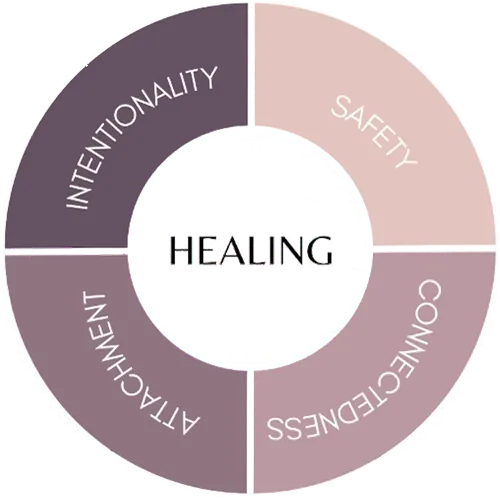What is Therapeutic Parenting?
Therapeutic Parenting is used to describe the type of intentional parenting that fosters the feelings of safety and connectedness so that a traumatized child can begin to heal and learn how to securely attach. Therapeutic Parenting is central to Enhanced Foster Care success!

Intentionality
Respond to children by being thoughtful and mindful of trauma history and being present.
Safety
Provide consistency, stability, and predictability to help the child have a sense of “felt safety.”
Attachment
Support attachment by validating the child’s feelings, setting limits and guidelines, and engaging in one-on-one teaching interactions.
Connectedness
Prioritize spending quality time with the child and give them full attention for a period of time.
Listen to the child and praise them when able.
How Can I Be More
Therapeutic in My Parenting?
The PACE model of parenting, developed by psychologist Dan Hughes, is designed to provide a framework for caregivers whose children may require a different parenting approach. PACE therapeutic parenting is a holistic approach to parenting that involves thinking, feeling, communicating, and behaving in a manner that cultivates feelings of safety and security for your child.
Playfulness
This means keeping communication fun; try using a light tone, like the one you might use when felling a story. Retraining from using a harsh tone or lecturing enables your child to maintain a sense of security, while diffusing tense or difficult situations.
“Wow! Look at that homework! It looks like a dog tried to eat it for dinner! Do you feel okay? You seem upset. Let’s put our heads together and see if we can figure this out together.”
Acceptance
Acceptance means validating your child’s experiences and emotions, rather than trying to change how they are feeling. You might not agree with their interpretation of a situation, or the way they are expressing themselves, but you accept them, nonetheless.
“It can be really difficult when you feel like you can’t do something. It’s not nice when you feel upset, but it’s okay to feel like that. I’m sorry that you feel like you hate your homework and your school.”
Curiosity
Curiosity invites you to ask yourself questions about why your child is feeling or acting the way they are, without placing judgement or blame. Approaching your child with an air of curiosity means wondering about the experience of your child and using this to better your understanding of them.
“You usually enjoy doing your homework. I wonder what has changed today? Is there something else that is making this tricky? I wonder if you are feeling tired . Do you think that is what’s upsetting you?”
Empathy
Being empathetic is not about reassuring the child or trying to make their problems go away. Rather, empathy means being present for your child in the moment, helping them feel less alone in their emotions, sitting with them and providing support and comfort.
“You seem to be really upset and frustrated right now. Is that right? I know how that feels, especially when you don’t want to do something. Why don’t we work through these feelings together?”